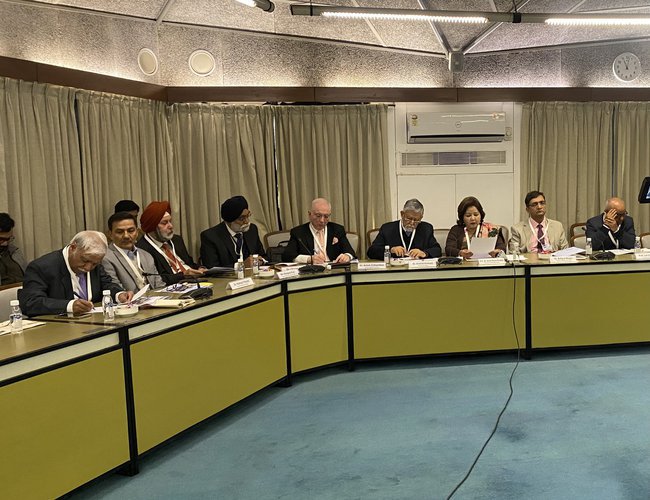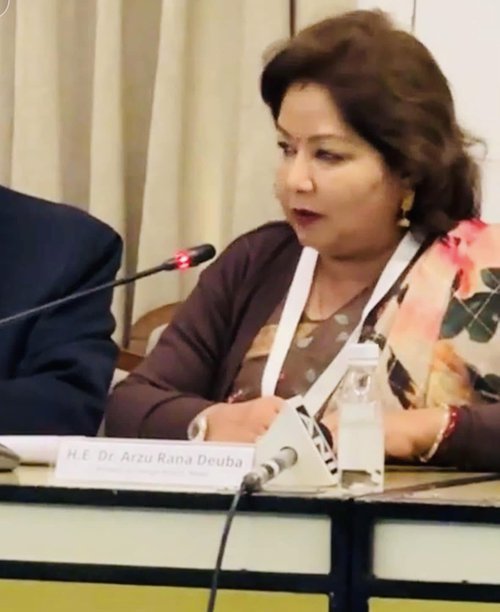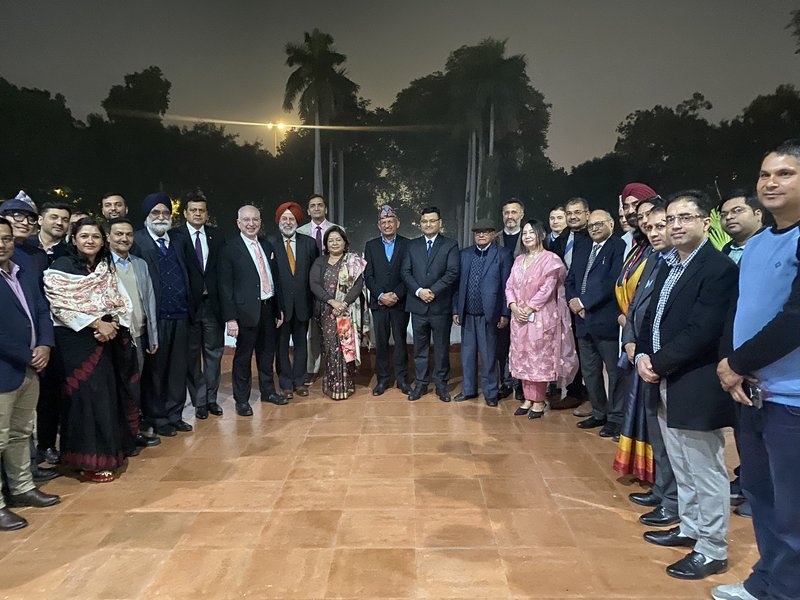
During her recent visit to New Delhi, Foreign Minister Dr. Arzu Rana Deuba emphasized the importance of establishing more air routes from India to enhance connectivity. While she traveled to various European countries last week, her two-day trip to India held significant importance.
Since assuming the role of Foreign Minister, Dr. Rana has been actively working to foster strong ties with India and its leadership. She believes that a close relationship with India is crucial for Nepal's economic development.
Following Prime Minister KP Sharma Oli's visit to China just a month ago, Dr. Rana's visit to India was aimed at conducting official business and undergoing a personal health check-up.
Despite the fact that India has not yet extended an invitation to PM Oli for a visit, Dr. Rana has been using various channels to communicate PM Oli's interest in visiting India.
Dr. Rana has urged India to consider opening additional air routes, citing the potential benefits for tourism and bilateral connectivity.
Dr. Rana, speaking at the Indo-Nepal Economic Conference in New Delhi, India, emphasized the importance of the newly opened international airports in Lumbini and Pokhara, two significant locations in Nepal. She mentioned that due to the high construction costs of these airports, Nepal seeks support from its close neighbor, India, to help make them fully operational. Dr. Rana also urged private Indian airlines to consider starting services to these airports to strengthen economic ties and promote people-to-people connections between the two countries.
The Indo-Nepal Economic Conference, organized by Kathmandu University, Nepal Centre for Contemporary Studies, and EGROW Foundation, aimed to foster a comprehensive economic partnership between India and Nepal for shared prosperity and mutual growth in the region. Dr. Rana highlighted the deep-rooted relationship between the two countries, based on shared culture, geography, and economic synergies. She also discussed the progress made in bilateral cooperation, including cross-border infrastructure projects, electricity trade, and investments

.Minister Dr. Rana encouraged Indian investors to explore opportunities in sectors such as hydroelectricity, infrastructure, and tourism in Nepal. She emphasized the importance of closer cooperation among South Asian countries to create a stronger regional synergy for increased resilience, prosperity, and sustainability.
She highlighted that the Government of Nepal has provided various incentives to airline companies to encourage the expansion of services.
The minister also emphasized the significant potential of religious and cultural tourism in Nepal and India. She suggested that promoting their religious and cultural treasures as tourism destinations could greatly benefit regional prosperity. Dr. Rana called for joint efforts to promote initiatives like the Ramayana Circuit and Buddhist Circuit for mutual gain.
During the conference, Dr. Rana urged Indian investors to consider investing in Nepal, noting that India is the largest investor in the country. She encouraged Indian private sector and entrepreneurs to explore the abundant investment opportunities in Nepal, citing the country's investment-friendly environment and recent improvements in policies and legislation to enhance the investment climate. Nepal has been awarded a ‘BB-’ rating by Fitch Ratings for its investment climate, positioning it as the second most attractive investment destination in South Asia after India.
She emphasized Nepal's willingness to establish Bilateral Investment Agreements (BIAs) with multiple countries to attract foreign investors. Nepal provides attractive incentives such as favorable corporate taxation, import duties, and export facilitation. The country ensures full repatriation of investment income and prohibits the nationalization of private enterprises. Nepal is focused on policy stability to promote foreign direct investment (FDI) and engage the private sector.
Dr. Rana highlighted the importance of eliminating non-tariff barriers, enhancing border trade facilitation, finalizing mutual recognition agreements, fostering regional value chains and intra-industry trade, upgrading trade-related infrastructure, and seeking India's assistance in enhancing productive capacity to address Nepal's trade deficit with India.
Regarding cross-border connectivity trade, she mentioned the landmark agreement between Indian Prime Minister Narendra Modi and former Nepalese Prime Minister Sher Bahadur Deuba in April 2022. This agreement aims to export 10,000 MW of power from Nepal to India within a 10-year timeframe.

Other agreements also cover joint development of Power Generation projects in Nepal, the development of cross-border transmission infrastructure, bi-directional power trade with appropriate access to electricity markets in both countries based on mutual benefits, market demand, and applicable domestic regulations of each country, coordinated operation of the national grids, and institutional cooperation in sharing the latest operational information, technology, and know-how.
"This agreement provides a compelling reason for hydropower developers to consider Nepal's energy market as a worthwhile investment opportunity today. Additionally, the recent signing of a historic tripartite power sales agreement has allowed Nepal to sell 40 MW of power to Bangladesh through the Indian grid. We greatly appreciate India's leadership in creating the conditions for this significant achievement."
Highlighting the strong ties between Nepal and India, based on a shared cultural heritage and economic synergies, she praised India's assistance to Nepal in education, health, infrastructure development, institutional capacity building, and industrialization, which has further deepened the relationship between the two countries.
She emphasized that Nepal has successfully institutionalized peace and democratic governance through a historic political transformation, with its current focus on achieving sustainable peace and prosperity through rapid socio-economic development.
She also requested ongoing support and goodwill from the international community, especially from neighboring countries, to help Nepal achieve its goal of graduating from its LDC status by 2026 and meeting the Sustainable Development Goals (SDGs) by 2030.
She emphasized the importance of enhancing regional and sub-regional platforms like BIMSTEC, BBIN, and SAARC to promote economic integration and support bilateral economic partnerships. Dr. Rana urged India to prioritize Nepal within its 'Neighborhood First' policy, stating that strengthening economic ties based on mutual interests and prosperity would benefit both nations.
- TEACHERS ON STRIKE: Students' Future In Jeopardy
- Apr 25, 2025
- NEPAL-THAILAND: Joint Business Council
- Apr 13, 2025
- BIMSTEC SUMMIT: Nepal’s Stand
- Apr 11, 2025
- IME GROUP: Expands Into Paper Industry
- Mar 24, 2025
- CPN UML: Instigated By India
- Mar 23, 2025














